Cyberscam Victim Says CCP Belt and Road Developers Are International Human Trafficking Syndicates Based in Cambodia
After the recent exposure of international fraud and human trafficking that victimized thousands of Chinese-speaking nationals from China, Taiwan, and Hong Kong, details about the fraud syndicates are surfacing as more rescued victims speak up.Much information has pointed to the Communist regime’s Belt and Road Initiative (BRI) developers based in Cambodia as the main culprits of the international crimes. The corrupt Cambodian government embraced the BRI loan from Beijing, and the money bred one of the richest men in China who was wanted for collecting a huge fortune from running online gambling and had escaped to Cambodia. Recently, the FBI reported that the relevant criminal acts, known as Pig Butchering, have spread to the United States from China and victimized many Americans over the years. Victim Speaks Up Tan Ban Kheng, a 41-year-old Chinese from Malaysia, told local media about three weeks of captivity in Cambodia, during which he was forced to commit fraud, after he finally escaped and fled to Malaysia. Tan also shared details about the illegal operations he saw while held in a compound in Cambodia with the Chinese language edition of The Epoch Times. He has been frequently harassed and threatened for exposing the scams to the media. He said that one of the main culprits involved in human trafficking and fraud was Prince Real Estate Group (Prince Group), a Chinese developer doing business in Cambodia following Beijing’s BRI arrangements. Tan alleges that the Prince Group has many underground businesses in Cambodia engaging in fraud, prostitution, and drugs. By April 2020, Cambodia Ministry data showed that it had granted licenses to about 170 casinos in Sihanoukville and most were owned by mainland Chinese companies. (Screenshot via the Phnom Penh Post) Cambodia Tan was a plant manager in China who returned to Malaysia when the COVID-19 outbreak occurred. In early May, he had four online interviews for a team leader position in customer service with a company in Cambodia. On May 6 he flew to Cambodia. A man met him at the airport, and picked up three other men on the way to the company’s office. He later realized the men who were picked up and claimed to be employees were actually there to prevent him from escaping. He was taken to a compound heavily guarded by Cambodian mercenaries. The compound was part of the Victory Paradise Resort and Casino (Resort), which is owned by the Prince Group. This hilltop resort with views of Sihanoukville, a coastal city in Cambodia, consisted of 10 high-rise buildings, closely controlled by armed men, who he later realized were Cambodian veterans. At the foot of the hill, men in black long-sleeved shirts and trousers carried long sticks or large guns; and guards with hounds constantly patrolled the grounds . Fraud Syndicates Cambodia was notorious for human trafficking and fraud before the COVID-19 pandemic, but the situation has only intensified, Tan said. At the compound, his passport was confiscated and he was warned to not run away because they had paid for his airline tickets, room and board, and deposits. He was assigned to a group, and over two days was trained on how to commit fraud, illegal online gambling, and online romance scams. He learned about various online scams involving employment, romance, crypto-investment, making targets take nude photos, and intimidation. Each team of 10 was equipped with mobile phones, two computers, seven or eight fake accounts, scripts of their deceptive lines, and so on, to target recent graduates, single parents, and retirees. Tan said, “There is a script for everyone. Rarely would people not fall for it.” The phones and computers of their team were connected to a large screen monitored by a supervisor. Any misconduct guaranteed beatings and jolts with electric batons. Tan estimated that there were about 7,000 people in the entire resort. Many victims chose to remain out of fear of reprisal. Others went voluntarily for they had no other way to make a living during the pandemic. A work room of the Victory Paradise Resort and Casino where Tan Ban Kheng, the Cambodia cyber scam victim, worked. He transferred the image to a friend before a guard found his cell phones. (Provided by Tan Ban Kheng) Seeks Help Tan managed to call his family, revealing his situation and asking for help from the police. But within half an hour of making the call, a guard broke into his room, pinned him to the ground, used a detector to locate the three mobile phones he had hidden, and made him reveal his passcodes. He had photographed records of what he saw at the compound with his phones just about every day. The scammers found information about his personal life, including the names of his family and in-laws, from his cell phones. To make matters worse, they transferred all his money. After the incident, his wife in China received warning phone calls. He was slapped on the face multiple times while someone pointed
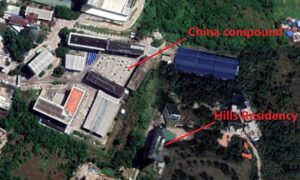
After the recent exposure of international fraud and human trafficking that victimized thousands of Chinese-speaking nationals from China, Taiwan, and Hong Kong, details about the fraud syndicates are surfacing as more rescued victims speak up.
Much information has pointed to the Communist regime’s Belt and Road Initiative (BRI) developers based in Cambodia as the main culprits of the international crimes.
The corrupt Cambodian government embraced the BRI loan from Beijing, and the money bred one of the richest men in China who was wanted for collecting a huge fortune from running online gambling and had escaped to Cambodia.
Recently, the FBI reported that the relevant criminal acts, known as Pig Butchering, have spread to the United States from China and victimized many Americans over the years.
Victim Speaks Up
Tan Ban Kheng, a 41-year-old Chinese from Malaysia, told local media about three weeks of captivity in Cambodia, during which he was forced to commit fraud, after he finally escaped and fled to Malaysia.
Tan also shared details about the illegal operations he saw while held in a compound in Cambodia with the Chinese language edition of The Epoch Times.
He has been frequently harassed and threatened for exposing the scams to the media. He said that one of the main culprits involved in human trafficking and fraud was Prince Real Estate Group (Prince Group), a Chinese developer doing business in Cambodia following Beijing’s BRI arrangements.
Tan alleges that the Prince Group has many underground businesses in Cambodia engaging in fraud, prostitution, and drugs.
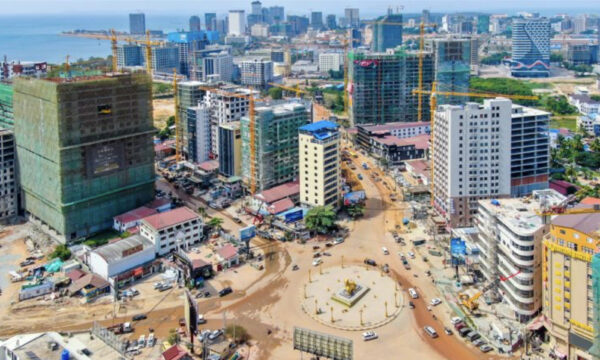
Cambodia
Tan was a plant manager in China who returned to Malaysia when the COVID-19 outbreak occurred.
In early May, he had four online interviews for a team leader position in customer service with a company in Cambodia. On May 6 he flew to Cambodia.
A man met him at the airport, and picked up three other men on the way to the company’s office. He later realized the men who were picked up and claimed to be employees were actually there to prevent him from escaping.
He was taken to a compound heavily guarded by Cambodian mercenaries. The compound was part of the Victory Paradise Resort and Casino (Resort), which is owned by the Prince Group.
This hilltop resort with views of Sihanoukville, a coastal city in Cambodia, consisted of 10 high-rise buildings, closely controlled by armed men, who he later realized were Cambodian veterans.
At the foot of the hill, men in black long-sleeved shirts and trousers carried long sticks or large guns; and guards with hounds constantly patrolled the grounds .
Fraud Syndicates
Cambodia was notorious for human trafficking and fraud before the COVID-19 pandemic, but the situation has only intensified, Tan said.
At the compound, his passport was confiscated and he was warned to not run away because they had paid for his airline tickets, room and board, and deposits. He was assigned to a group, and over two days was trained on how to commit fraud, illegal online gambling, and online romance scams. He learned about various online scams involving employment, romance, crypto-investment, making targets take nude photos, and intimidation.
Each team of 10 was equipped with mobile phones, two computers, seven or eight fake accounts, scripts of their deceptive lines, and so on, to target recent graduates, single parents, and retirees. Tan said, “There is a script for everyone. Rarely would people not fall for it.”
The phones and computers of their team were connected to a large screen monitored by a supervisor. Any misconduct guaranteed beatings and jolts with electric batons.
Tan estimated that there were about 7,000 people in the entire resort. Many victims chose to remain out of fear of reprisal. Others went voluntarily for they had no other way to make a living during the pandemic.

Seeks Help
Tan managed to call his family, revealing his situation and asking for help from the police. But within half an hour of making the call, a guard broke into his room, pinned him to the ground, used a detector to locate the three mobile phones he had hidden, and made him reveal his passcodes.
He had photographed records of what he saw at the compound with his phones just about every day.
The scammers found information about his personal life, including the names of his family and in-laws, from his cell phones. To make matters worse, they transferred all his money.
After the incident, his wife in China received warning phone calls.
He was slapped on the face multiple times while someone pointed a gun at him. He was hit with a chair. Three men dragged him into a small cell, and left him there for two days. The cell had an iron door, no windows, and was filled with the odor of urine and stool.
There was no ventilation. “I passed out, feeling dead … I didn’t eat or drink; I thought I was going to die,” he said.
When they released him from the cell, they took various photos of him naked, and close-ups of his body parts, and then filmed him getting in a vehicle, walking around, carrying luggage, smiling, and so on. Tan, feeling nauseated, weak, exhausted, and hungry, followed their orders throughout the entire afternoon.
He was told to either do as they said or be sold somewhere else.
Regains Freedom
“I prayed to Jesus, because I am a Christian,” Tan said. He followed his supervisor’s orders 100 percent to keep himself alive, while trying to observe and memorize what he encountered every day.
He learned about the structure of the resort.
Near the end of May, someone kindly hid him in their car and drove him out of the resort.
He gave all his cash, around $300, to the driver. “I didn’t trust any local police, not even the embassy,” he said, as many people warned him that the local police are also part of the gangs.
Back in Malaysia, he reported what happened to him and what he witnessed to the police three times but neither they or the government took any action. “I was very mad, very angry. That online recruitment company continues recruiting people to the resort,” he said.
In June, he started receiving strange calls demanding that he withdraw his claims in the media and his report to the police, but he didn’t comply.
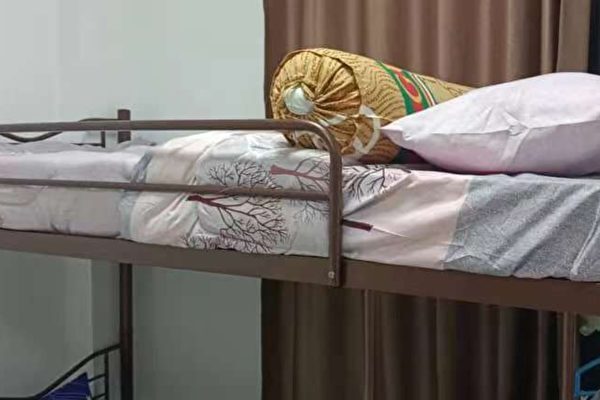
Den of Crimes
Tan indicated that the Prince Group, which is publicly a group of real estate developers, has a huge chain of fraudulent businesses around the world, with a well-established money laundering system.
Tan said he learned about the Prince Group after he was trafficked to the Resort. The manager at the Resort once told him that the Prince Group is the big boss of the resort. Tan says that the Prince Group engages in fraud, prostitution, and drug businesses using its multiple locations in Cambodia.
Among the many compounds and resorts the group built in various parts of Cambodia, the Victory Paradise Resort located at Sihanoukville is famous for underworld businesses.
The owners and bosses of the Prince Group enjoy nepotism and connections at the highest level of the Cambodian government. Tan said that its management was mainly by mainland Chinese and Malaysians.
He said that Cambodia is an extremely corrupt country. The Cambodian authorities treat the country as private property and run the nation like a private enterprise.
According to the 2021 Corruption Perception Index, Cambodia is the most corrupt country in the ASEAN region.
Tan described the facilities inside the Resort: mini markets, hair salons, clinics, licensing centers, restaurants, recreational centers, canteens, drug centers, prostitute massage spas, Ktv bars, karaoke, and tattoo shops, all guarded by heavily armed army personnel, surveillance cameras, and a Tibetan mastiff.
On Aug. 16, the Prince Group issued a clarification statement about job scams by people impersonating the Prince Group.
The Epoch Times tried to contact both the Prince Group and the Resort for comment. But the phone call went unanswered, and the email was undelivered.
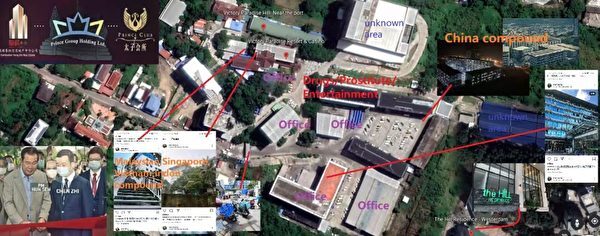
BRI—A Corrupt Network
Job scams in Cambodia have entrapped thousands of Taiwanese inside Cambodia, most held against their will, as they face electric baton beatings and even organ harvesting.
Taiwan’s Foreign Minister, Joseph Jau-shieh Wu commented on Aug. 20 that these nefarious activities were “a legacy of China’s ‘Belt and Road’ initiative.”
Sihanoukville was a strategic locale of China’s BRI. The inflow of large Chinese capital, labor, and construction quickly turned the originally peaceful beachside town into a hub for crime syndicates along with an influx of Chinese-funded enterprises and casinos in just a few years.
In 2017, the Cambodian government embraced China’s pledge of $240 million and the two countries signed 13 infrastructure and trade agreements under the BRI framework.
According to its website, the Prince Group is primarily engaged in the development of hotels, chain supermarkets, food and beverage outlets, and philanthropic endeavors. The group has a wide array of ground-breaking projects in Cambodia across the real estate industrial chain.
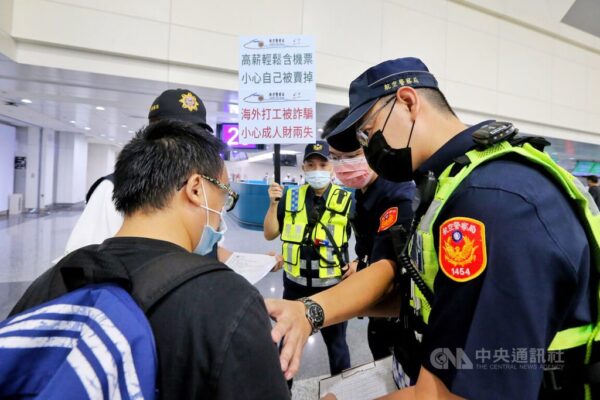
‘Pig Butchering’
The Prince Group entered Cambodia in 2015, and became the leading conglomerate in the country. The chairman, Chen Zhi, developed a very close relationship with Cambodian Prime Minister Hun Sen.
Chen, also known as Neak Oknha Chen Zhi—a Cambodia duke honored by Hun Sen upon his substantial financial contributions—is a Chinese national who obtained Cambodian citizenship and later became Hun Sen’s advisor, a Chinese media reported in August.
A 2021 Chinese report touted Chen’s success in Cambodia, even though how Chen made his fortune was little known.
An insider revealed, “He left China in 2009 and disappeared,” but in 2018 this mysterious man “suddenly showed up” as the most influential rich person in Cambodia, said the report.
However, Chinese netizens described Chen as: “A wanted,” “Gained his first pot of gold by running online gambling,” “This type of person probably started with dirty money. If he went to Cambodia so early, he may be the very start-up of the pig butchering scams.”
The FBI reported in April that “The fraud is named for the way scammers feed their victims with promises of romance and riches before cutting them off and taking all their money.”
The scam started in China, but is becoming more prevalent in the United States, according to the FBI report.
In 2021, the FBI Internet Crime Complaint Center received more than 4,300 complaints related to crypto-romance scams, resulting in more than $429 million in losses, the FBI stated.
Fang Xiao and Gu Xiaohua contributed to this report.












